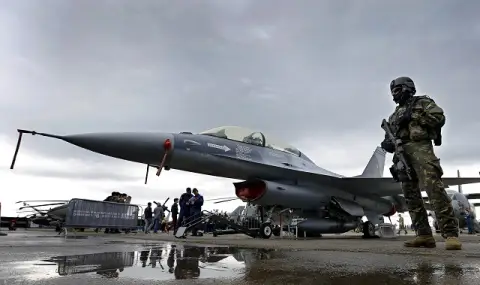Ukrainian officials are urging the US and other countries to increase training F-16 pilots, arguing that the current plan does not prepare enough airmen to fly the planes that will soon be donated to Kiev.
Ukraine says it has 30 pilots who can begin training in the US immediately. However, the Biden administration has told Kiev that there are not enough seats in the Arizona-based program to accept more than 12 trainee pilots at a time, according to three people with direct knowledge of the request. Two other sites in Denmark and Romania have a similar problem with available training places.
This is the latest setback in a protracted effort to deliver advanced F-16 fighter jets to Ukraine. Kiev began pushing for the planes in the months after Russia's full-scale invasion in February 2022, but was repeatedly rebuffed by the Biden administration. In May 2023, President Joe Biden green-lighted requests from other countries to send their F-16s, but logistical challenges have repeatedly delayed the training. Further complicating the effort was the fact that it took months for Western countries to agree to send their planes to Ukraine.
Denmark, Norway, the Netherlands and Belgium plan to send more than 60 US-made F-16s to Kiev this summer. The Ukrainians say the ability to use more F-16s will help Kiev push Russian forces back from the front lines in places like Kharkiv, where Moscow has advanced in recent weeks. However, the US said it does not expect the planes to change the situation on the battlefield.
This material is based on interviews with eight former and current US, Ukrainian and European officials and lawmakers, many of whom spoke on condition of anonymity to talk about sensitive diplomatic conversations.
In a series of meetings and talks over the past few weeks, Ukraine has formally asked the US to train additional pilots at the Morris Air National Guard base. in Tucson, Arizona. Lawmakers on Capitol Hill, including Rep. Jim Himes (D-Kan.) and Rep. Mike Turner (R-Oh.), the heads of the House Intelligence Committee, also pushed for the administration to approve the additional training. The two, along with several other lawmakers, wrote a letter to the Pentagon last month asking the administration to prioritize the issue.
But the U.S. has told the Ukrainian military that, in addition to limited space, other countries are in line for F-16 training at the base and that it cannot violate its commitments to those countries.
„We understand that they don't want to violate these contracts, but they could move their American pilots to another training base,” said Sasha Ustinova, a Ukrainian lawmaker who advocates for the training.
The National Guard plans to train a total of 12 Ukrainian pilots by the end of September at the Tucson base, according to Air Force spokeswoman Laurel Falls. In addition to Arizona, the training facility in Denmark also has limited space and is preparing to close in November. A third program, which is located in Romania and will be managed by contractors, has not yet started.
„Tens“ pilots from several countries are conducting F-16 basic flight training and training in the United States and Europe, Pentagon spokesman Maj. Charlie Dietz said, declining to confirm the specific number.
„We have developed and are implementing a training plan that meets the estimated timescales for bringing the aircraft into service, which are ultimately determined by a number of factors, including maintenance and support needs, infrastructure and support equipment requirements, timescales for supply of aircraft, as well as the workload of the pilots”, Dietz said.
Major Erin Hannigan, spokeswoman for the Arizona National Guard, confirmed that places in the program are limited due to commitments to training requests from other countries, funding and meeting English language proficiency requirements for potential cadets.
„In addition to Ukrainian students, there are many other countries that have maintained year-round study,” says Hannigan. “The number of international student pilots and where they come from is not determined by our school, there are many other factors that play a role in the number such as funding, requests from countries, student completion of English language studies and allocation of funds .“
The Air Force also trains F-16 pilots at Luke Air Force Base, Arizona, and Joint Base San Antonio, Texas, but those programs also have limited slots for international students. These seats are usually reserved well in advance for pilots from other countries that operate the F-16.
According to a former Ministry of Defense official involved in the program, another eight Ukrainian pilots are being trained in Denmark. But that facility will be closed next year and will no longer participate in training as the Danish Air Force transitions to the F-35.
Meanwhile, F-16 maker Lockheed Martin and its subcontractor Draken are also preparing to train pilots at a facility in Romania, but that program is expensive and will also have limited space, according to the former employee and a person familiar with the program. A Lockheed spokesman referred questions about the facility in Romania to the governments of the United States, Romania and the Netherlands.
A total of 20 Ukrainian F-16 pilots are expected to graduate by the end of this year, half of the 40 needed to operate a full squadron of 20 planes, according to the former Defense Department official. Eight new pilots are slated to begin training in Romania, and another eight will soon arrive in Tucson, the former official said. The facility in Denmark will not accept additional pilots.
Among the training facilities, only four places will be open for Ukrainian pilots by the end of the year, according to the person familiar.
Meanwhile, US officials have been warning for months that the F-16 will not make a huge difference to Ukraine on the battlefield.
Although the planes “will give the Ukrainians an increase in capabilities that they do not currently have ... they will not dramatically change their overall military capability,” Air Force Secretary Frank Kendall said last year.
